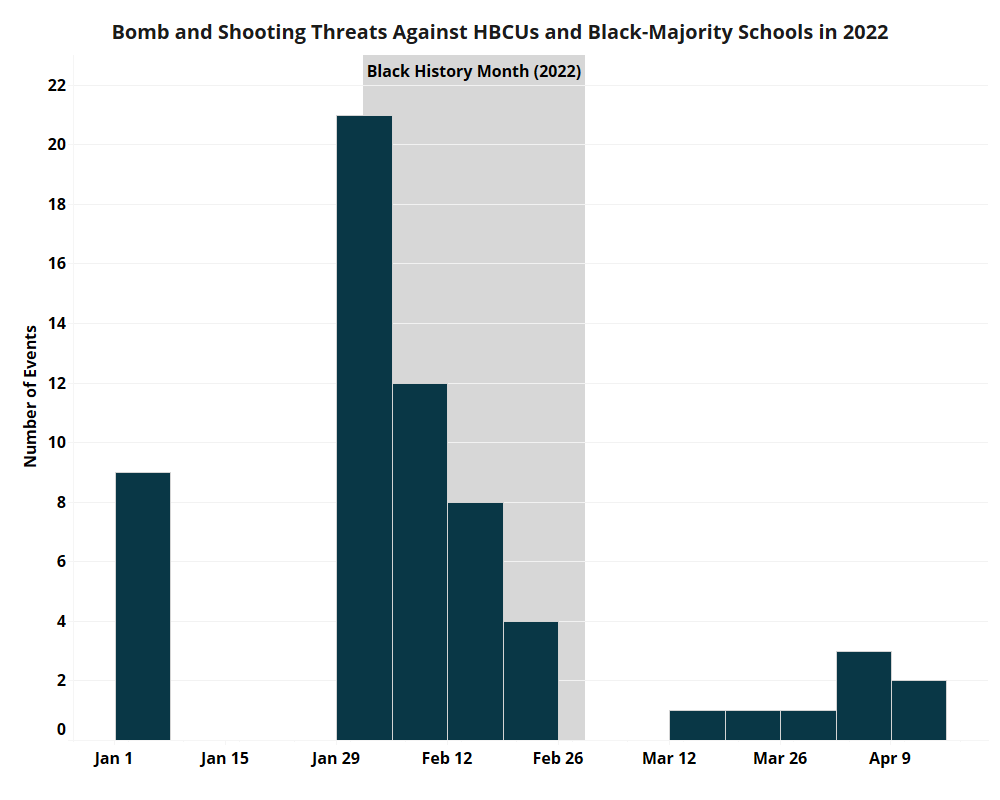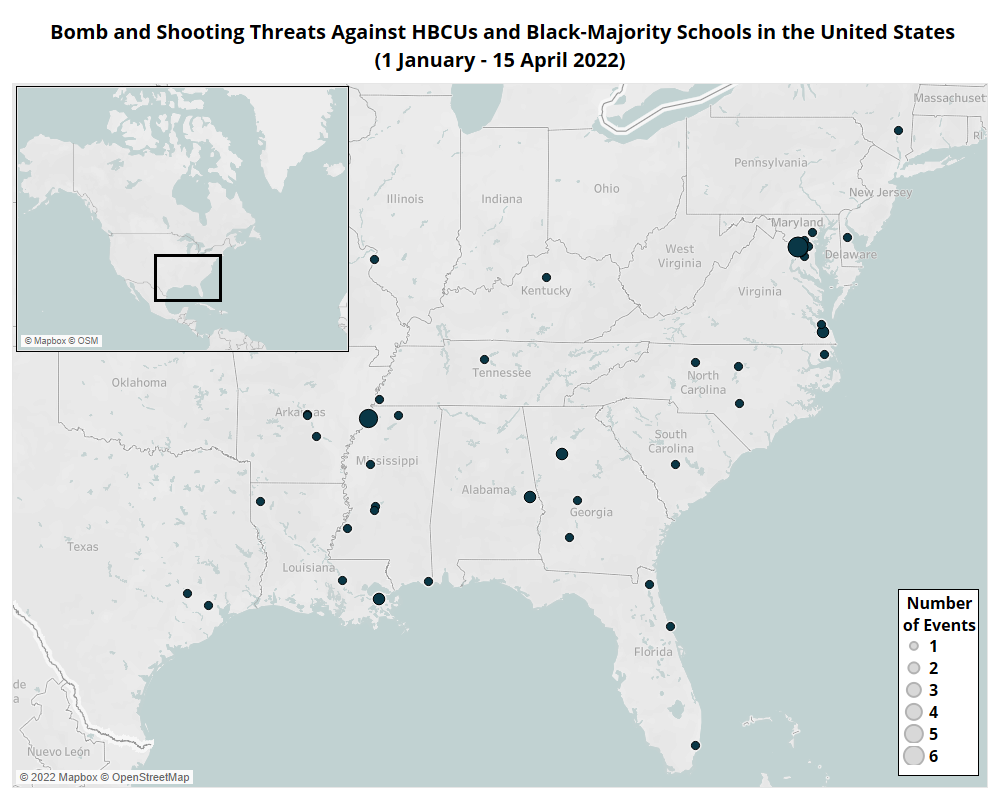Key Trends
- As of mid-April, ACLED has recorded 72 bomb or shooting threats1Note that these 72 threats are coded across 62 bomb and shooting threat events captured under ACLED’s ‘Strategic Developments’ event type. ACLED is an event-based dataset, meaning that threat events are coded, rather than the number of individual threats. One bomb or shooting threat event can include several threats and the number of threats can vary from one event to another in cases where ACLED records multiple schools being targeted on the same day and in the same location. For this analysis, the ‘Notes’ of each ‘Strategic Developments’ threat event were reviewed to determine the number of individual threats. against Historically Black Colleges and Universities (HBCUs) and Black-majority K-12 schools across the United States in 2022.2Schools are categorized as Black-majority schools if Black students make up the largest percentage of students, as indicated by the US News & World Report’s Education search tool (see US News & World Report, 2022).
- Bomb or shooting threats against HBCUs and Black-majority schools have been reported in at least 16 states and Washington, DC.
- Threats spiked during the first week of February, coinciding with the start of Black History Month, and continued at a lower rate through March and into April.
Overview
Since the beginning of 2022, the United States has seen a spate of bomb and shooting threats against schools and universities around the country, with at least 80 threats reported as of mid-April.3ACLED began recording bomb and shooting threats against schools as ‘Strategic Developments’ after a pattern of threats began to take shape in the first week of January 2022. Although threats are not typically captured in the dataset unless they escalate into physical violence, ACLED has identified these threats as an emerging and sustained trend that could have an impact on current political violence and protest activity and/or serve as an indicator of future political violence and protest activity in the United States. While, for these reasons, ACLED has systematically coded bomb and shooting threats against schools since the beginning of 2022, this is not the case for all ‘Strategic Developments’ events. Unlike other ACLED event types, ‘Strategic Developments’ should not be broadly assumed to be cross-context and -time comparable. For more on ‘Strategic Developments,’ see this guide to using ‘Strategic Developments’ for analysis. The overwhelming majority of these threats — 72, or 90% — have targeted HBCUs or Black-majority K-12 schools.
At the start of January, multiple threats were reported during the first week of school following winter break. After several weeks without any reported incidents, threats against HBCUs and Black-majority schools surged at the end of the month, peaking between 29 January and 5 February (see graph below), when threats were reported at 20 different locations. The spike in threats coincided with the first week of Black History Month in the United States, which is commemorated annually in February. ACLED records at least one threat against an HBCU or Black-majority school during each week of Black History Month. While the number of threats has declined since the end of February, further threats were also reported during the second half of March and into April.
 The wave of threats against HBCUs and Black-majority schools comes at a time of heightened pressure on school boards. Throughout 2021, school boards faced frequent demonstrations and meeting interruptions as well as hundreds of violent threats made by opponents of COVID-19 restrictions and critical race theory (CRT) (NPR, 30 August 2021).4 Teachers unions and education policy analysts have noted that CRT is predominantly taught in colleges and law schools, not elementary schools and high schools, suggesting that anti-CRT legislation “is really aimed at erasing and whitewashing American history” for young students (CBS News, 8 July 2021). Demonstrations over CRT spiked in 2021 as states introduced legislation aimed at banning discussion of institutional racism in schools (for more on demonstrations related to CRT, see this ACLED Fact Sheet). In 2022, school board members have continued to face threats over COVID-19 mandates, CRT, and other issues like access to bathrooms for transgender students, often fueled by disinformation campaigns (Reuters, 15 February 2022).
The wave of threats against HBCUs and Black-majority schools comes at a time of heightened pressure on school boards. Throughout 2021, school boards faced frequent demonstrations and meeting interruptions as well as hundreds of violent threats made by opponents of COVID-19 restrictions and critical race theory (CRT) (NPR, 30 August 2021).4 Teachers unions and education policy analysts have noted that CRT is predominantly taught in colleges and law schools, not elementary schools and high schools, suggesting that anti-CRT legislation “is really aimed at erasing and whitewashing American history” for young students (CBS News, 8 July 2021). Demonstrations over CRT spiked in 2021 as states introduced legislation aimed at banning discussion of institutional racism in schools (for more on demonstrations related to CRT, see this ACLED Fact Sheet). In 2022, school board members have continued to face threats over COVID-19 mandates, CRT, and other issues like access to bathrooms for transgender students, often fueled by disinformation campaigns (Reuters, 15 February 2022).
Bomb and shooting threats have been made against HBCUs or Black-majority schools in 15 of the 19 states where HBCUs have been established, in addition to Washington, DC (HBCU First, 2022). Only two threats recorded by ACLED have occurred in states without an HBCU: on 10 March, police investigated a bomb threat and potential armed individual at Santa Ana High School, which is a Latinx-majority school in Santa Ana, California; and on 21 March, school operations were disrupted at Poughkeepsie High School and Poughkeepsie Middle School, two predominantly Black schools in Poughkeepsie, New York, due to a shooting threat on social media that extended over three days.
Although it makes up the smallest geographic area, more bomb threats have been reported in Washington, DC than any state (see map below), with 19 threats recorded between 4 January and 14 February. Meanwhile, 10 threats were reported in Mississippi between 1 February and 6 April — the highest number of any state. Nearly half of the bomb threats in Mississippi occurred in Tunica in northwest Mississippi, including a threat against Tunica Elementary School, one of only two recorded threats against an elementary school. Significant numbers of threats have also been reported in Maryland (seven) and Georgia (five).
A US-based 501(c)(3) non-profit organization established in 2014, ACLED is the highest quality and most widely used real-time data and analysis source on political violence and demonstrations around the world.
If you would like to use ACLED data and analysis, please review our Terms of Use & Attribution Policy. For more information about ACLED methodology, please check our Resource Library.
For media inquiries, please contact: Sam Jones, ACLED Head of Communications





